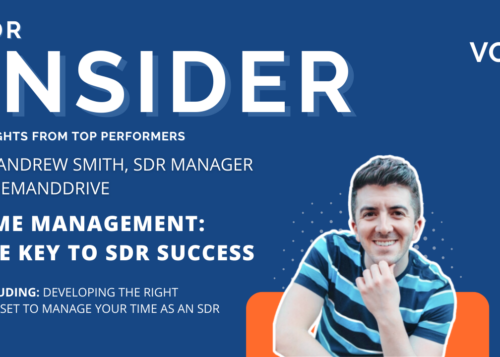From Acronym to Sales Career

SDR Insider #2
SDR: From Acronym to Sales Career is an episode that walks you through the journey of starting as a new SDR with little-to-no sales knowledge, to cultivating relationships, honing in on networking skills, and eventually, creating a career path for yourself.
This episode is a great listen for both new and tenured reps, showing how even though it might have just sounded like a funny acronym, being an SDR helps build foundational skills for a future career in sales or marketing.
For the second episode of SDR Insider we’rejoined by Pat Burns – former SDR at demandDrive and now a Business Development Manager for the same client he once worked with as a Sales Rep at dD.
He shares his best tips for moving up the figurative corporate ladder while also creating meaningful connections along the way. His success is inspirational for those interested in moving up into a manager-level role, yet he reminds us he started in your shoes (yes, you!).
Key Takeaways
Conversations Spark Ideas and Open Doors
Not every sales career starts with a background in sales; it’s often the opposite, which was Pat’s experience shifting from the real estate world to an SDR position.
At the beginning of our conversation, Pat shared key advice to anyone looking to network or further their career, whether in sales or another industry. He explained that after connecting with a new contact, he would finish the conversation by asking a question.
“Are there two other people you recommend I connect with?”
Although this tactic specifically is how Pat became an SDR, it can also be beneficial advice when discussing your future and next steps as a Sales Rep looking to advance.
Editor’s Note: Leveraging referrals is a key tenant of account mapping, one of the core skills required for success in sales. Not only will adopting this referral-based mindset help you in your overall career, but it will also help you in your day-to-day.
Advocate for Yourself and Communicate Effectively
“For anyone that’s moving from (an) SDR and wants to continue their role in sales, I think clear communication (is key).”
Although sometimes your intentions with your career may seem apparent, it is essential, just like in any relationship, to be clear about your intentions.
If you are interested in the prospect of expanding your horizons in your sales career, it is important to voice that and advocate for yourself.
“It’s okay to let them know that being upfront. And then also, I think just finding different ways to add value. So thinking outside the box, you know, showing that you’re interested.”
Editor’s Note: Your manager knows that you don’t want to be an SDR forever – almost nobody does (or expects it from you). Proactively thinking about your next steps is never a bad thing, and it saves you from that dreaded “oh wow, I’m sick of this” moment.
Show You’re Ready to Grow
From that last point, there’s a difference between saying you are ready to be challenged and grow in your career and showing that you are ready.
Feedback is a large piece of that, “asking for formal feedback and if there’s anything that you can be doing better. I think those are maybe just a few ways that if you’re interested in transitioning to your client might be good to keep in mind.”
Feedback and information are key, so as well as asking for feedback on your current wheelhouse, demonstrate you are willing to expand that knowledge as well.
“Read articles that your prospects might be reading. Think about… what resources they’re reading to stay up to date in the industry. So I think just making sure that you’re demonstrating a genuine interest.”
Editor’s Note: Don’t just ‘talk the talk’ – if you want to demonstrate your ready to move up in your role, you have to ‘walk the walk’ as well. We talked about the mindset required for success and growth in a previous event – the onus is on you.
Prospecting Never Ends!
I wrapped up our conversation by asking Pat a little about what has stuck with him since he left his SDR position and moved into a manager role.
He said it’s his prospecting skills.
“Keeping the mindset that you’re calling someone based on the research you’ve done. And then you have something that could genuinely help them” is a crucial takeaway from his time as an SDR that he still uses today.
Editor’s Note: Glengarry Glen Ross popularized the ABC acronym – Always Be Closing. I believe that you should also ABP – Always Be Prospecting. It’s a skill that will serve you forever, and it helps contribute to the cause (even if it’s not your ‘job’ anymore). Plus, one of the best ways to rally your team is by jumping into the bullpen with them and making dials.
Sales Rep new or old, we hope you found this episode and post helpful. We’re looking forward to sharing more insights from top performers through the SDR Insider, a new initiative from demandDrive.
If you are interested in being included in a future episode or have an idea for a conversation, feel free to reach out to our marketing team at marketing@demanddrive.com.
Related Resources
Continue exploring

To Succeed in Sales…You Have to Fail

‘No’ In Sales Isn’t Rejection, but Redirection

Time Management – The Key to Success

You Got The Job! Now What?

SDR Intent and The dD Academy

Psychological Safety for SDRs

